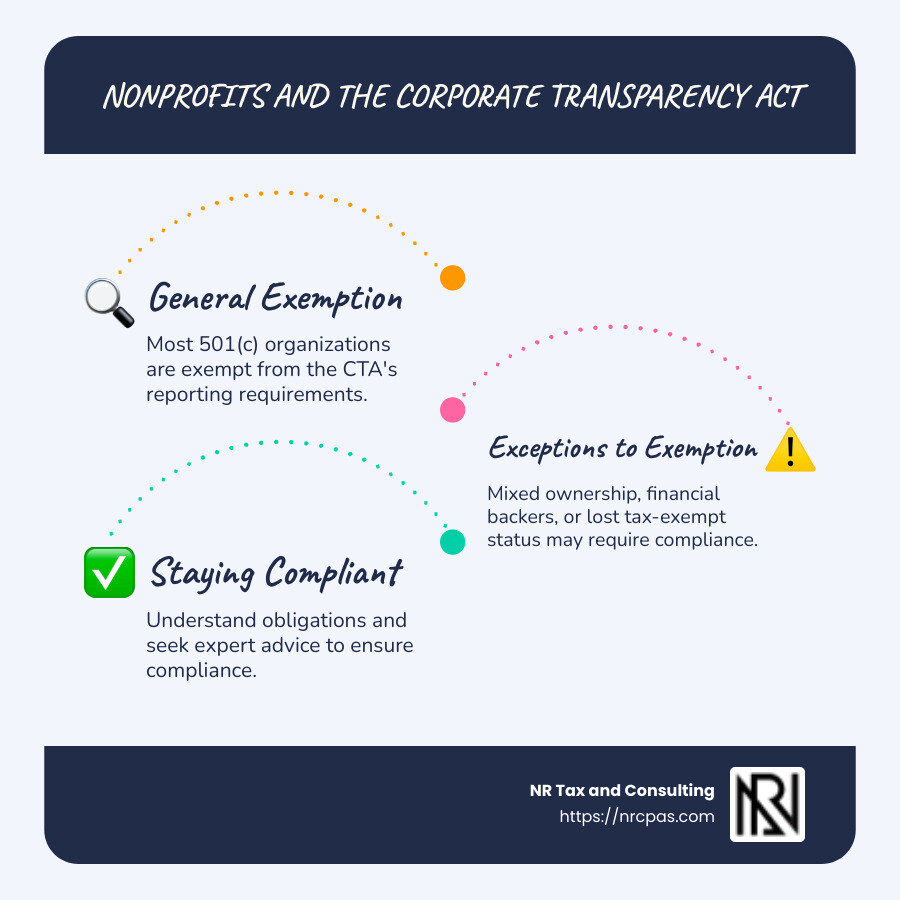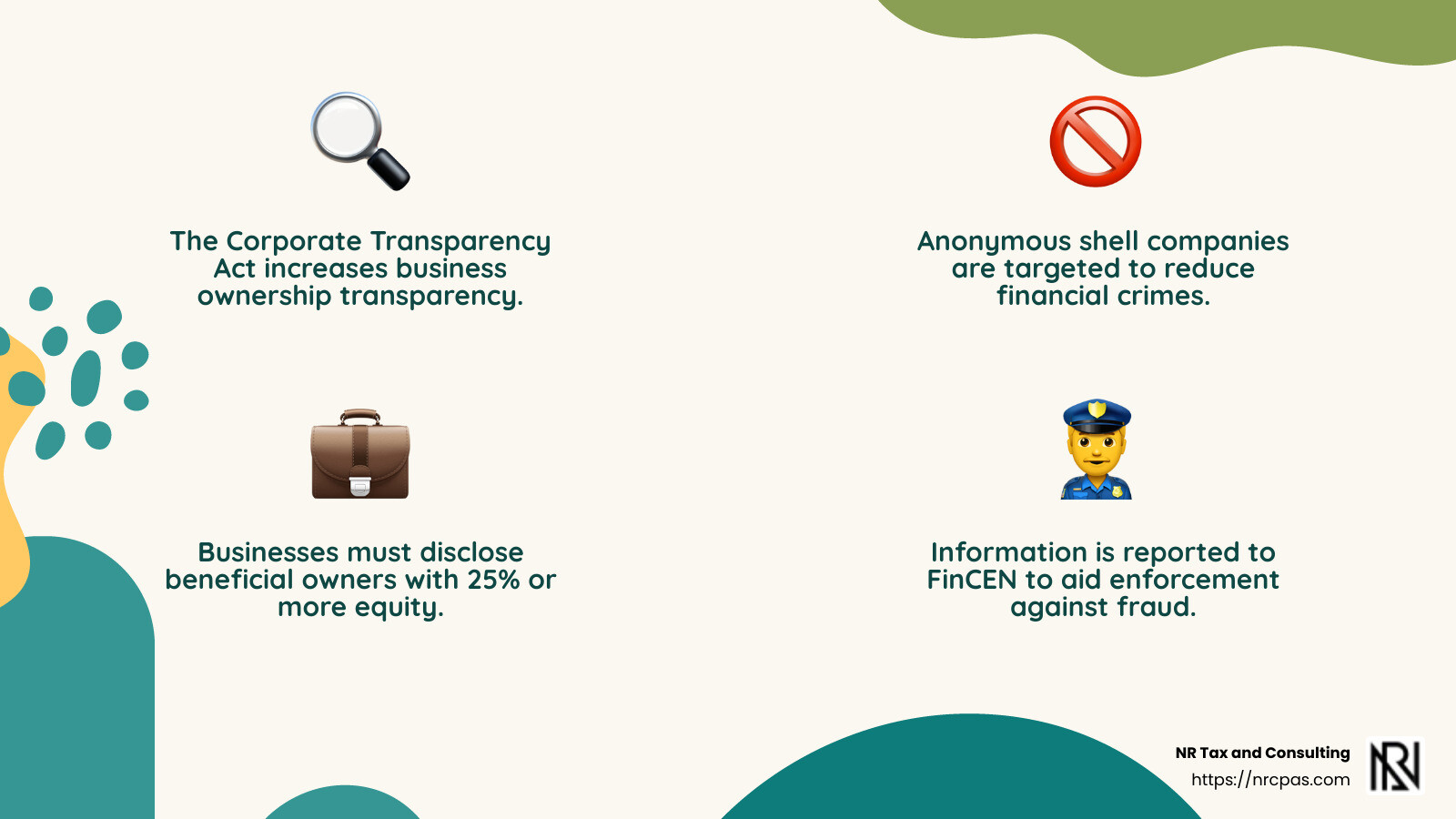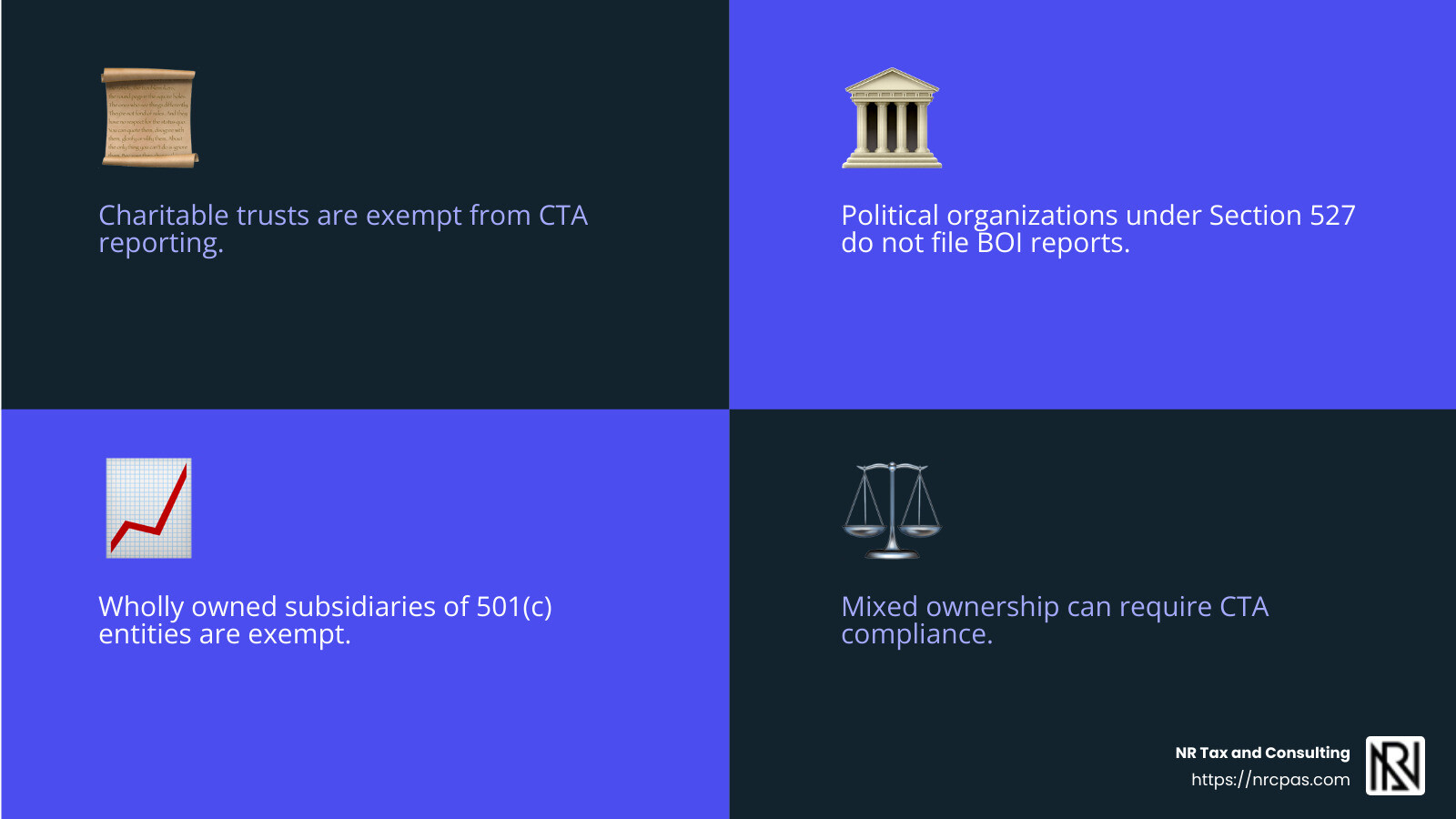Does the Corporate Transparency Act Apply to Your Nonprofit?

Does the corporate transparency act apply to nonprofits? This question has become increasingly relevant as the Corporate Transparency Act (CTA) takes effect, aiming to unveil beneficial ownership information to prevent financial crimes like money laundering and tax fraud. For most nonprofits, especially those recognized under Section 501(c), the straightforward answer is no—they are generally exempt. However, there are crucial exceptions and specific situations where compliance is necessary, which could impact your organization.
The main goal of the CTA is transparency. It’s not just about reporting; it’s about who needs to report. While the majority of nonprofits enjoy exemptions, organizations must be aware of the nuances that could obligate them to file. Entities that support 501(c) organizations financially, or those with mixed ownership, might find themselves within the reporting net. Understanding these details ensures your nonprofit remains compliant and upholds its reputation.
I’m Nischay Rawal, founder of NR Tax and Consulting, with over a decade of experience in financial management and navigating complex regulatory landscapes. My work focuses on simplifying these processes for small business owners, ensuring they understand whether their nonprofit must comply with the CTA.

Image Alt Text: Infographic detailing Corporate Transparency Act nonprofit exemptions and compliance criteria - does the corporate transparency act apply to nonprofits infographic infographic-line-3-steps-blues-accent_colors
Handy does the corporate transparency act apply to nonprofits terms:
corporate transparency act exemptions
corporate transparency act reporting requirements
who has to file corporate transparency act
Understanding the Corporate Transparency Act
The Corporate Transparency Act (CTA) was introduced to combat illicit financial activities like money laundering and tax fraud. It aims to bring more transparency to business ownership in the United States by requiring certain entities to disclose their Beneficial Ownership Information (BOI) to the Financial Crimes Enforcement Network (FinCEN).
Purpose of the CTA
The primary goal of the CTA is to prevent the misuse of anonymous shell companies. These companies can be easily set up without revealing the true owners, making them ideal for hiding illegal activities. By requiring businesses to disclose their beneficial owners, the CTA seeks to make it harder for criminals to operate under the radar.

Image Alt Text: The CTA aims to prevent financial crimes like money laundering and tax fraud. - does the corporate transparency act apply to nonprofits infographic 4_facts_emoji_nature
Reporting Requirements
Under the CTA, many businesses must report their beneficial owners to FinCEN. A beneficial owner is anyone who owns or controls at least 25% of the entity's equity interests or exercises substantial control over the entity. This includes senior officers and individuals with the authority to appoint or remove senior officers.
The information required for each beneficial owner includes:
Full legal name
Date of birth
Residential address
Identification number (like a driver's license or passport)
Image of the identification document
For new companies, the initial report is due within 90 days of formation, while existing companies have until January 1, 2025, to comply. Any changes in ownership must be reported within 30 days.
Role of FinCEN
FinCEN is a bureau of the U.S. Department of the Treasury responsible for collecting and analyzing information about financial transactions. It plays a crucial role in enforcing the CTA by maintaining a secure database of beneficial ownership information. This database is accessible to law enforcement agencies and other authorized bodies to help prevent financial crimes.
While the CTA introduces new reporting obligations, it also provides several exemptions, particularly for nonprofits. Understanding these exemptions is vital for ensuring compliance and avoiding unnecessary filings.
Does the Corporate Transparency Act Apply to Nonprofits?
If you're wondering, does the Corporate Transparency Act apply to nonprofits, the answer is: it depends. Let's break down how the CTA impacts different types of nonprofit organizations and their reporting obligations.
501(c) Organizations and Exemptions
Many nonprofits fall under the category of 501(c) organizations. These organizations are generally exempt from the CTA's reporting requirements. This exemption applies to entities like charitable organizations, churches, and private foundations that qualify under Section 501(c) of the Internal Revenue Code. However, it's important to note that this exemption only applies if the organization is recognized as tax-exempt under Section 501(a).
For example, a nonprofit formed as a 501(c)(3) organization does not need to report its beneficial ownership information to FinCEN if it maintains its tax-exempt status. If a 501(c) organization loses its tax-exempt status, it has a 180-day grace period to regain it before it must comply with the CTA.
Reporting Obligations for Nonprofits
While most 501(c) organizations are exempt, some situations require nonprofits to file a BOI report. If a nonprofit has its tax-exempt status revoked and does not regain it within the grace period, it must report its beneficial ownership information within 30 days. Additionally, newly formed nonprofits with a pending tax-exempt application may not qualify for the exemption initially and must file until their status is approved.
Nonprofits that are not exempt must report the following information to FinCEN:
Legal name and any trade names
Principal place of business address
Jurisdiction of formation
IRS taxpayer identification number
For each beneficial owner, nonprofits must also provide:
Full legal name
Date of birth
Residential address
Identification number
Understanding these exemptions and obligations is crucial for nonprofits to ensure compliance with the CTA and avoid unnecessary filings.
Next, we'll explore key exemptions for nonprofits, including charitable trusts and political organizations, to help clarify which entities are required to report.
Key Exemptions for Nonprofits
Navigating the Corporate Transparency Act (CTA) can be tricky for nonprofits. Luckily, there are key exemptions that many nonprofit organizations can benefit from. Let's explore these exemptions.
Charitable Trusts
Charitable trusts, including split-interest trusts like charitable lead and remainder trusts, are exempt from the CTA's reporting requirements. These trusts are specifically mentioned under Section 4947 of the Internal Revenue Code and are considered tax-exempt entities. This means they do not need to report their beneficial ownership information, as long as they maintain their tax-exempt status.
Political Organizations
Political organizations, defined under Section 527 of the Internal Revenue Code, also enjoy an exemption from CTA reporting. These organizations are primarily involved in influencing elections and are exempt from taxes under Section 527(a). So, if your nonprofit is a political organization, you won't need to worry about filing a BOI report with FinCEN.
Wholly Owned Subsidiaries
Subsidiaries that are wholly owned by one or more 501(c) tax-exempt organizations are another group exempt from CTA reporting. This exemption applies whether the subsidiary is a for-profit or nonprofit entity. As long as the ownership is entirely under the control of a 501(c) entity, the subsidiary does not need to file a report. However, if the ownership is mixed, meaning a portion is owned by a non-exempt entity, then the subsidiary must comply with CTA reporting requirements.

Image Alt Text: Understanding exemptions for nonprofits helps ensure compliance - does the corporate transparency act apply to nonprofits infographic 4_facts_emoji_blue
These exemptions are crucial for nonprofits to understand to determine whether they need to comply with the CTA. Next, we'll discuss situations where compliance is required, even for some exempt entities.
Situations Requiring Compliance
While many nonprofits are exempt from the Corporate Transparency Act (CTA), there are specific situations where compliance is necessary. Let's look at some key scenarios.
Mixed Ownership
If a nonprofit owns a subsidiary, the exemption only applies if the nonprofit is the sole owner. Mixed ownership, where a nonprofit shares ownership with non-exempt entities or individuals, changes the game. For example, if a charity owns 50% of a business, and the other 50% is owned by a private individual, the business entity must file a Beneficial Ownership Information (BOI) report with FinCEN. This ensures transparency in ownership and control, even if part of the ownership is exempt.
Revoked Tax-Exempt Status
Nonprofits that lose their tax-exempt status must act quickly. They have a 180-day grace period where they remain exempt from CTA reporting. However, if they do not regain their tax-exempt status within this period, they must file their initial BOI report within 30 days. This rule helps ensure that entities no longer qualifying for exemptions are promptly reported to maintain transparency.
Pending Tax-Exempt Applications
Newly formed nonprofits with pending applications for tax-exempt status face a unique challenge. Until the IRS approves their Form 1023 application, these organizations are not considered tax-exempt under Section 501(c). As a result, they are not automatically exempt from CTA reporting. Most will need to file a BOI report within 90 days of formation. Once their tax-exempt status is confirmed, they can stop ongoing reporting obligations, but initial compliance is crucial to avoid penalties.
Understanding these situations is essential for nonprofits to ensure they meet their compliance obligations under the CTA. Next, we'll dive into frequently asked questions about nonprofits and the CTA to clear up any remaining confusion.
Frequently Asked Questions about Nonprofits and the CTA
Who is exempt from the Corporate Transparency Act?
The Corporate Transparency Act (CTA) has specific exemptions for certain types of organizations. 501(c) organizations are generally exempt, including charities, educational, religious, and other tax-exempt entities. Additionally, political organizations and charitable trusts are exempt. Subsidiaries that are wholly owned by one or more 501(c) entities also enjoy this exemption. However, it's crucial for nonprofits to understand that simply being a nonprofit doesn't automatically exempt them from CTA requirements.
Are charities exempt from CTA?
Yes, most charities classified under 501(c)(3) are exempt from the Corporate Transparency Act. This exemption means they do not need to file Beneficial Ownership Information (BOI) reports with FinCEN. However, if a charity loses its tax-exempt status, it must comply with CTA reporting after a 180-day grace period unless the status is reinstated within that time. It's important for charities to maintain their tax-exempt status to continue enjoying this exemption.
Does a non-profit need to file a BOI?
Not all nonprofits need to file a BOI report. If a nonprofit falls within the exempt categories under the CTA, such as being a 501(c) organization, it does not need to file. However, nonprofits with mixed ownership or those that have lost their tax-exempt status must file a BOI report. Newly formed nonprofits with pending tax-exempt applications also need to file until their status is approved. Nonprofits should carefully assess their situation to determine if they must comply with BOI reporting.
Understanding these exemptions and requirements helps nonprofits steer their obligations under the CTA effectively.
Conclusion
Navigating the complexities of the Corporate Transparency Act (CTA) can be challenging, especially for nonprofits. At NR Tax and Consulting, we understand the intricacies of these regulations and are here to offer our expertise.
Compliance Guidance
Our goal is to help nonprofits determine if they fall under the CTA's reporting requirements. We provide clear, personalized guidance to ensure your organization remains compliant. Whether you're a charitable trust, a political organization, or a subsidiary, understanding your obligations is crucial. Our team is equipped to assist you in identifying whether you qualify for any exemptions and what steps to take if you don't.
Expert Advice
We pride ourselves on delivering expert advice custom to your nonprofit's specific needs. Our team stays updated on the latest developments in nonprofit regulations, ensuring that you receive accurate and timely information. Whether you're dealing with mixed ownership, a change in tax-exempt status, or pending applications, we can help you steer these situations with ease.
For more information on how we can assist with your compliance needs, visit our Tax & Compliance page. Our team at NR Tax and Consulting is here to support you every step of the way, so you can focus on what you do best—making a difference in your community.
Want tax & accounting tips and insights?
Sign up for our newsletter.